
Guests
- Marwa Elbiallylawyer for Aafia Siddiqui.
- Mauri' Saalakhandirector of operations for The Aafia Foundation.
During Saturday’s synagogue attack in Colleyville, Texas, the gunman Malik Faisal Akram repeatedly called for the release of Pakistani neuroscientist Aafia Siddiqui, who is serving an 86-year sentence in a U.S. federal prison located just miles from the synagogue. Siddiqui was convicted in 2010 on charges that she intended to kill U.S. military officers while being detained in Afghanistan two years earlier. However, many questions remain unanswered about her time in U.S. custody, and her conviction was secured without physical evidence and on U.S. officials’ testimony alone, says Siddiqui’s lawyer, Marwa Elbially. Elbially says there’s a false impression of Siddiqui in the U.S. as a terrorist, even though terrorist charges were never brought against her, and Pakistan officials have voiced concern about her arrest and detention. We also speak with Mauri’ Saalakhan, director of operations for The Aafia Foundation, who calls Siddiqui’s case an unprecedented miscarriage of justice.
Transcript
AMY GOODMAN: This is Democracy Now!, democracynow.org, The War and Peace Report. I’m Amy Goodman, with Juan González.
As we continue our coverage of the 11-hour hostage standoff at a synagogue outside Fort Worth, Texas, Saturday, we turn to look at the complex case of an imprisoned Pakistani neuroscientist, Dr. Aafia Siddiqui. During the standoff, the armed gunman, Malik Faisal Akram, a British man, repeatedly called for Dr. Siddiqui’s release. She is currently serving an 86-year sentence at Federal Medical Center, Carswell prison in Fort Worth, which is like 20 miles from the Beth Israel synagogue in Colleyville, Texas. In Pakistan, she’s considered a political prisoner. In the United States, some call her “Lady al-Qaeda.”
In 2010, the MIT-Brandeis-trained Pakistani neuroscientist was convicted of attempted murder for allegedly shooting at U.S. soldiers and FBI agents while jailed in Afghanistan in 2008. In fact, none of the Americans were injured, but Dr. Siddiqui was shot and wounded while she was in their custody. Many questions remain unanswered about her time in U.S. custody. Dr. Siddiqui’s supporters say she was forcibly disappeared, along with three of her children, by Pakistani authorities in 2003 and interrogated and tortured for years by the United States at the Bagram Air Base and other locations. U.S. authorities say Siddiqui was never held by the U.S., was arrested in July 2008 by Afghan police and handed over to U.S. authorities.
We’re joined now by two guests. Marwa Elbially is with us. She’s the current lawyer for Aafia Siddiqui. And Mauri’ Saalakhan is with us, the director of operations for The Aafia Foundation.
I want to begin with Dr. Siddiqui’s lawyer, Marwa Elbially. You were there outside Dallas on Saturday, Marwa. You expressed your horror and the horror of the Siddiqui family at what was taking place with the armed gunman holding the hostages, the rabbi and three others. Can you start there and then just briefly tell us the story of Dr. Siddiqui, who the gunman kept saying he wanted released?
MARWA ELBIALLY: Yes. Thank you, Amy.
First of all, we are so thankful that the hostages were released safely and that the rabbi and his congregants weren’t harmed. What happened there was despicable, and it is not acceptable to anyone.
Dr. Aafia Siddiqui, during her sentencing, stated that she doesn’t want any violence done in her name. And I haven’t had the chance to speak with her about what happened. I don’t think she even — she might not even know about the events of Saturday. But we just wanted to make that very clear, that she and her family have always said that they don’t want any violence done in her name.
Just to make the audience aware, there’s a lot of misinformation out there about Dr. Aafia Siddiqui’s case. And it has been made to display as if she has been charged and tried for terrorism, which has never happened. As you mentioned earlier, she was tried for allegedly being able to get a weapon from a U.S. soldier and shoot it at them multiple times. There was nobody injured other than herself. There was no physical evidence. So, there was no gunshot residue on her person or clothing. There was no fingerprints on the weapon. There was no shell casings from the weapon she allegedly fired, no bullet holes. So no physical evidence. When she went to trial, it was based on the testimony — and contradictory testimony — of the individuals that were in the room. And her trial itself was extremely unusual in that there was a threat to the jury, which resulted in the dismissal of two jurors. The defense moved for a mistrial, which the judge denied. And then she was sentenced to 86 years. And again, I can’t emphasize enough that she was never charged with terrorism. So this false moniker exists out there against her, in which they refer to her as “Lady al-Qaeda” and other names, where there’s no — she was never tried for any of that in a court of law here in the United States.
The other thing that I think is very important to mention is she is well known in Pakistan and is referred to, by no less than the former prime minister, as “the daughter of the nation.” And that was Prime Minister Yousaf Gilani. And both the National Assembly and the Pakistani Senate have passed resolutions on her behalf, in which they stated — the National Assembly of Pakistan in 2008 stated that they’re deeply concerned about her arrest and detention, and they’re concerned about the lack of information about her underage children, who were underaged at that time. And then, again in 2018, the Senate of Pakistan, Resolution number 399, said that it appreciates the efforts made by the Parliament of Pakistan and its committees for the repatriation of the daughter of the nation. The House reiterates that there is a dire need to take up the matter with the government of the United States of America again and solve the same. So this is by no means a fringe issue. There’s a serious concern out there about Dr. Aafia Siddiqui, and it’s really, really unfortunate that it’s come again to media attention with somebody that she has no connection with, no — like, that she would never support whatsoever.
JUAN GONZÁLEZ: And, Marwa Elbially, I wanted to ask you: The issue of her originally being disappeared back in 2003 as a result, apparently, of the complicity of a previous Pakistani government with the FBI, could you talk about that and how she then ended up in Afghanistan?
MARWA ELBIALLY: Yes. So, in 2003, March of 2003 — so, Dr. Aafia Siddiqui studied here in the United States for over 10 years. She was on a student visa. She is a graduate of MIT undergrad, and then Ph.D. in neuroscience, where she studied how children learn through imitation. She moved back to Pakistan in June of 2002. In March of 2003, the FBI issued a seeking information alert. They said that they didn’t have any evidence connecting her or her ex-husband, who also had a seeking information alert issued for him, Dr. Mohammed Amjad Khan — didn’t have any evidence connecting either of them to terrorism but that they were wanted for questioning.
What we do know happened is that several news organizations, including NBC Nightly News, Newsweek, the Indian Express, Dawn, published articles that said she had been taken in for questioning. And then, all of a sudden, within a few days, that was walked back. And what we do know is that from March of 2003 until July of 2008, Dr. Aafia Siddiqui’s location was never confirmed. She was mentioned both by the NYU Law Center for Human Rights and Global Justice in a 2005 “Fate and Whereabouts Unknown: Detainees in the 'War on Terror'” report, that she was potentially in U.S. detention and may be held in a U.S.-controlled secret location or foreign facility. And then she was again mentioned in the 2006 Amnesty International report. And we also have — like, we have formal apologies from the former foreign minister of Pakistan in 2012, and he goes — and I quote — “I’m sorry for handing over the innocent Dr. Aafia Siddiqui to the Americans. It was my biggest mistake ever.”
So there is a lot of questions surrounding her location and whereabouts between 2003 and 2008. And Dr. Aafia Siddiqui maintains that she was held in secret prison sites. And her name is mentioned in two of the footnotes of the Senate Intelligence Committee report on torture, and only the executive summary has been released, so we don’t know if she and what really happened to her is included in the 6,000 actual — 6,000-page actual report.
AMY GOODMAN: Can you just explain how she was then picked up in 2008, after five years? I mean, I just watched the former deputy director of the FBI, Andrew McCabe, saying, “Some say she was held by the U.S. for five years. That is not true.” And he said, “I was very closely connected to that case.” But she was picked up in Ghazni, far, far from, for example, Bagram, with her elder son, with, what, bomb plans? And that’s when she was taken in by the authorities, handed over to the U.S., where she was then accused of trying to escape and open fire?
MARWA ELBIALLY: Yes. So, she disappeared off of the streets of Karachi, Pakistan, in — like, as we mentioned, in 2003. So, hundreds of miles away, in Ghazni, Afghanistan, which I believe is only an hour or two away from Bagram or Kabul, she was found on the street by Afghan police. She can’t speak any of the local languages. She looked completely disheveled. She was emaciated, weighed about like 90 pounds at the time of her reappearance. She only had her eldest son with her. Her two other children were nowhere to be found. And so, the Afghan police took her into custody, and then — on July 17th. And then, on July 18th, U.S. two FBI agents were flown in from Kabul by helicopter, and then local soldiers, who were based in FOB Ghazni, went in to question her.
The official story is that they were brought into an Afghan police station, they went into a room that was separated by a yellow curtain, and that they did not know that she was behind this curtain, and that one of these soldiers, out of respect for Afghan culture, puts down his M4 rifle, which every — from what I’ve read, every military member would never keep a distance from their weapon, especially when they’re on foreign soil in the middle of a war. He says that he puts it down, and somehow Dr. Aafia manages to grab it, pick it up, like, turn off the safety and fire shots. And then the interpreter grabs her, and then somehow they manage to shoot her multiple times in the stomach — the soldiers in the room — and nobody else was injured.
JUAN GONZÁLEZ: Well, if we can, I’d just like to bring in Mauri’ Saalakhan, the director of operations for The Aafia Foundation. Could you talk about why you’ve become such a vocal supporter of Dr. Siddiqui?
MAURI’ SAALAKHAN: Yes. First of all, thank you for having us on and for dealing with this topic.
In short, I heard former U.S. Attorney General Ramsey Clark, when we were together in Fort Worth, Texas, for Aafia Siddiqui, and also he wanted to pay a visit to both Aafia and Lynne Stewart, who was imprisoned at the same institution at that time. He said in a speech, “The case of Dr. Aafia Siddiqui is the worst case of individual injustice I have ever witnessed.”
When he said these words, they resonated with me, because that is the way I felt. I’ve been a human rights advocate for about three decades, and of all the cases and issues I’ve ever dealt with, this case has been the heaviest on my heart. This is the worst of the worst. And so, this is the reason why we connected to it in a year after she was brought back to the United States half-dead, and we have been vigorously doing as much as we possibly can to secure her release and repatriation since then.
AMY GOODMAN: Well, I want to thank you both for being with us. We’re going to continue to cover these stories. Mauri’ Saalakhan, director of operations for The Aafia Foundation, and Marwa Elbially, current lawyer for Aafia Siddiqui. Again, the lawyer and family condemned what took place at the Colleyville synagogue.
That does it for our show. Democracy Now! is currently accepting applications for a human resources manager. You can learn more and apply at democracynow.org.
Democracy Now! is produced with Renée Feltz, Mike Burke, Deena Guzder, Messiah Rhodes, Nermeen Shaikh, María Taracena, Tami Woronoff, Charina Nadura, Sam Alcoff, Tey-Marie Astudillo, John Hamilton, Robby Karran, Hany Massoud. I’m Amy Goodman, with Juan González. Stay safe. Wear a mask.

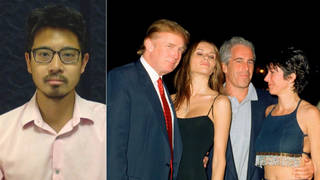
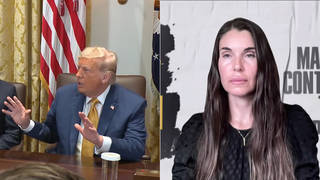
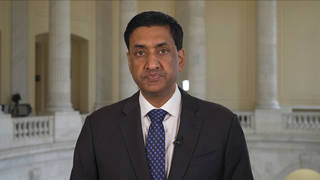
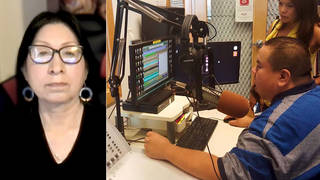





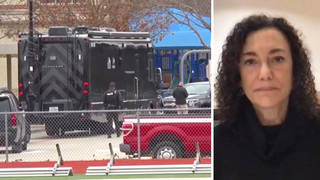

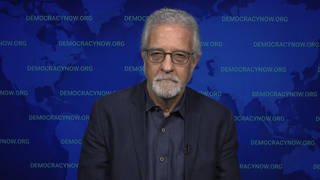
Media Options